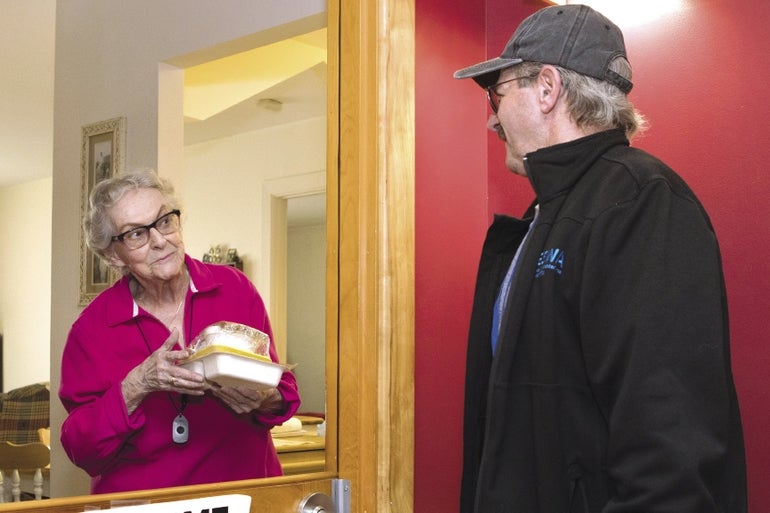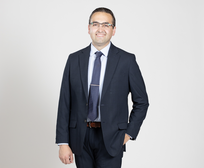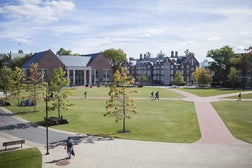
Senior centers are struggling to keep the elderly active during the pandemic
 Photo | Matthew Wright
Worcester area resident Evelyn McTigue greets Meals on Wheels delivery man Paul Frigon just outside her home in this 2019 photo.
Photo | Matthew Wright
Worcester area resident Evelyn McTigue greets Meals on Wheels delivery man Paul Frigon just outside her home in this 2019 photo.
Senior citizens continue to be a population largely affected by the coronavirus pandemic, as senior care facilities, nursing homes, senior centers, and programs adapt and fight to protect the well-being of elders.
As of Aug. 11, Massachusetts has had 1,898 individuals between the ages of 70 and 79, and 5,496 individuals over the age of 80 who have died from the coronavirus to date, according to the Department of Public Health.
In order to protect the vulnerable senior population through socially distant approaches and activities, many different strategies have been enacted as the coronavirus continues to force change within the lives of the elderly.
Finding senior engagement within COVID
Amy Waters, director of the Worcester Senior Center, said although in-person operations are not occurring, virtual alternatives have been successful at the city-funded facility designed to keep at-home seniors active.
“The city equipped staff with the technology to work effectively from home,” Waters said. “We are able to access our database, so from day one of the pandemic, staff began making wellness check phone calls to senior center participants and later expanded our calls to the city’s older residents.”
The Worcester Senior Center has now made 15,000 contacts, while help has been provided for the centers various services. Vetted volunteers help the center adhere to the U.S. Centers for Disease Control guidelines to manage food and supply delivery, assistance with critical benefits, health insurance, as well as housing.
Waters said one concern with virtual operations was making sure all seniors were able to access the internet.
“We made the shift to remote programming remarkably well,” Waters said. “Realizing that many seniors would not be able to access the internet, the city government channel videographers were enlisted to help create videos, which air on Channel 192, now fondly known as the Worcester Senior Center-Stay Connect Channel.”
Waters said after utilizing many partnerships, different programs are now offered to senior members seven days a week. Some offerings include fitness, education, and entertainment programs. Various staff members moderate telephone calls and classes with groups.

Senior education during a pandemic
The Worcester Institute of Senior Education, which is a community-based institute sponsored by Assumption University, has shifted to online learning. Monica Gow, director of WISE, said the shift has helped seniors and staff stay connected through courses and clubs.
“It still provides intellectual stimulation, offers a sense of community, and socialization,” Gow said. “It really gives people structure and routine, and the classes and clubs that we are doing online gives something for people to look forward to especially in these challenging times.”
Zoom calls with virtual experiences have been put into place, to replace in-class instruction, and operations.
“We offer what we call CWI’s, or conversations with instructors,” Gow said. “That really gave people an opportunity to come familiar with Zoom. It gave instructors the opportunity to practice a different delivery system than in a classroom. Those were huge changes for everyone.”
Gow said although WISE has been unable to do events and trips, the institute brought everything online, including classes, clubs, and featured speakers. Seniors can talk to friends privately, next to socializing with instructors.
“It’s different than an 18 year old hopping on for a class. There is a learning curve,” Gow said. “There is a lot of coaxing and encouraging people, and we are providing as much of that as needed to get people to go online. The ones who have been very hesitant, who have tried it, have loved it.”
WISE holds, what Gow calls, Zoom coffee breaks acting as an instructional resource for members wanting to learn more about how to use Zoom.
Issues at nursing homes
Nursing homes, where seniors live and receive health care, have been hit with the tragic realities the coronavirus puts upon the older generation.
Matt Salmon, CEO of SALMON Health and Retirement of Westborough, which operates eight long-term care facilities in Central Massachusetts, said the system has to get creative to keep serving its patients.
Much like the City of Worcester, SALMON developed a television channel at its Willows of Worcester facility to broadcast information to residents about proper hand washing, changes in its public policy and a live question-and-answer session with Salmon.
“Since we have several sites, we get to leverage what becomes a best practice at one site versus another,” Salmon said. “It was a powerful use of technology to help keep our residents engaged and informed, and ultimately, safe.”
When the pandemic began, SALMON’s Beaumont Rehabilitation and Skilled Nursing Center in Worcester was vacated of its residents and turned by UMass Memorial Health Care into a dedicated COVID-19 treatment center, which saw 253 patients.
Beaumont has since been converted back into a nursing home, although the experience created a hectic time for everyone, Salmon said.
“Prior to COVID-19, nursing homes had limited exposure to infectious diseases with any significant scale. That meant we all had a lot of learning and catching up to do,” Salmon said.
Tara Gregorio, president of Massachusetts Senior Care Association, said government action is necessary for three steps: allowing nursing homes to offer a premium hero wage for staff, ensuring adequate personal protection equipment, and increased testing.
Next to nursing homes continuing efforts to procure PPE, with many experiencing multiple challenges doing so, Gregorio said retention of staff remains an evident issue. In many cases, without financial support, facilities are unable to provide bonuses and premiums to frontline workers.
“To stabilize the nursing facility workforce, it is essential that the Commonwealth’s MassHealth program continues to provide facilities with the resources,” Gregorio said. “To offer a premium hero’s pay to our caregivers, while also ensuring their safety through the consistent availability of personal protective equipment.”
At Massachusetts Senior Care Alliance, Gregorio said the alliance is finding financially burdened pools of workers and giving as much financial incentives as it can to existing staff. The alliance is working with the legislature and administration to help modernize the reimbursement system in order to strengthen nursing facilities.
“The COVID pandemic hit the nursing facility sector at a particularly vulnerable time,” he said. “As the Massachusetts Center for Health Information and Analysis, an independent state agency, has documented that more than half of nursing facilities are operating on negative budgets.”
Jeffrey Kinney, chief of staff and external relations at Worcester nonprofit Ascentria Care Alliance, which owns three skilled nursing facilities, said nursing home staff are some of the lowest paid in the economy.
“Nursing homes in Massachusetts and in many other states have been chronically underfunded for years,” Kinney said. “Which results in [skilled nursing facilities] not being able to raise wages in a competitive work environment.”
Kinney sees an opportunity for legislatures to increase wages for frontline workers at an economically sustainable level, as well as making appropriate reimbursement rate changes.
Fighting senior isolation
“Since the care and safety of our residents has been and will continue to be our primary focus,” Kinney said, “we have had to significantly alter our procedures in order to reduce risk. Unfortunately, that has led to unavoidable social isolation of our residents.”
During the age of the coronavirus pandemic, senior citizens increasingly battle health concerns, restrictions and isolations. This concern has resulted in an emphasis on creative ways of keeping elders connected with family.
“We have tried to ease that burden by providing new creative ways to engage residents with socially distanced activities, tablets for easier communication with family and friends, and seek to provide ongoing updates to family members about current conditions at each facility,” Kinney said.
Gow highlights the importance of recognizing the harmful effects of isolation and lack of routine for seniors.
“The isolation, the boredom, loneliness, and a lack of routine is a big thing, and a lack of physical contact due to the social distancing protocols,” Gow said. “I would say the solutions would be to try and find a way to engage with others, and continue to stimulate your mind, and to socialize and engage with the community even if it’s online.”
Waters compares the isolation seniors face to the effects of smoking 15 cigarettes per day, and makes special efforts to reassure those most anxious and vulnerable. She said the Worcester Senior Center staff is assisted in this effort by UMass Medical School students in Worcester, who enjoy serving as senior buddies, calling them weekly.
“Hopefully many people in Worcester are also talking with their family, friends, neighbors and whoever can offer and receive positive attention,” Waters said. “With hugs needing to remain virtual for the most part, we all need to reach out at a distance.
“Needless to say, most people are remarkably resilient,” Waters said. “Everyone is worthy of the best quality of life, even when special efforts are required.”












0 Comments